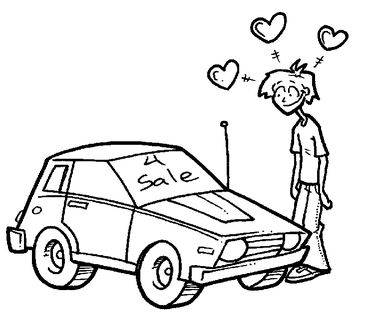
Chapter 12
The Wheels Thing
In This Chapter
✧ Understanding why we love our cars
✧ Deciding if, and when, to buy your first car
✧ Negotiating different options for buying a car
✧ Exploring some alternatives to car ownership
✧ Keeping routine car expenses in mind
Probably one of the first major purchases you’ll make during your lifetime, or that someone will make for you, is a car. The phrase “I can’t wait until I have a car of my own” is a common theme among teens who see a set of wheels as a means of independence and a sign of maturity, as well as a convenient method of getting from one place to another.
Our society depends on automobiles for convenience and speed. We don’t like to have to wait for a bus or train, or to depend on someone else for transportation. We like to step out to our garage or the curb, get into our cars, and take off. That’s not to say, however, that cars are really necessary for everyone. We talked about the difference between wanting something and really needing it in Chapter 2, “Using Money to Get What You Want” and that discussion certainly applies to cars. There are families in America that own more cars than there are family members.
In this chapter, we look at how Americans became so car crazy in the first place, and the implications of owning a car. You also learn about good and not-so-good ways of buying a car, in case you and your parents decide there’s one in your future. And because this book is about your money and finances, you’ve got to know about all the expenses involved with owning a car. So, put up your feet and let’s talk cars.
America’s Love Affair with the Automobile
There’s no question about it, Americans love their cars. We bought more new cars and trucks in 1999 than in any other year—nearly 17 million of them. That’s not to say that we didn’t buy a lot of cars before the end of the 20th century. Organized in 1903, the Ford Motor Company had sold more than a million cars by 1920 (remember there were a lot fewer people back then). The automobile has had, and continues to have, a huge impact on the way we live.

Imagine That
Almost half of the total automobile sales in 1999 were trucks or sport utility vehicles (SUVs)—an indication that we not only want cars, we want big, powerful machines that will take us anyplace, even if we just use them to drive the kids to school and go to the grocery store.
Automobiles give us great freedom. They give us the freedom to work in a town that we live miles away from, visit friends and family whenever we want to, and travel to places we might not otherwise see. Consider that, years ago, the practical limit of wagon travel in a day was 10 to 15 miles. That means that anyone who lived farther than that from a city, a railroad, or a form of water transportation was virtually isolated. Can you imagine being able to go no farther than 15 miles in a day? It’s practically unthinkable to a nation of people who hop into cars and drive that distance to go for dinner at a restaurant we like.

Imagine That
It’s been said that Henry Ford freed common people from the limits of their geography when he marketed the first car produced for mass consumption. Gotta agree with that!
Think for a minute about all the businesses and industries related to our automobiles. In addition to the companies that actually manufacture cars, there are loads of businesses that wouldn’t exist if there were no cars. Consider those listed in the following:
✧ Fuel stations
✧ Auto repair shops
✧ Drive-through restaurants, banks, and so forth
✧ Highway construction firms
✧ Highway patrol and police
✧ Convenience stores
✧ Car washes
✧ Accessories for cars such as seat covers, fancy hubcaps, and those auto deodorizer trees
✧ Car insurance companies
✧ Licensing centers
✧ Car radio system manufacturers
An interesting thing is that many Americans strongly identify with the cars they drive. In some ways, our cars become extensions of who we are. Many people display bumper stickers on their cars or decorate them in other ways to personalize them. You probably know at least one or two people who spend inordinate amounts of time cleaning, polishing, and waxing their cars. We also tend to admire people, at least superficially, who drive the newest, fastest, fanciest cars. How many times have you heard somebody say something like, “Oh, you know Charlie. He’s the guy with the Porsche”?
To some degree, we even expect people to buy cars that fit their status and station in life. You’d probably look twice if you saw the governor of your state cruising through town in a beat-up, rusty, old Ford Escort. That’s because someone who’s been assigned a level of public status and authority is expected to have a car that fits that persona.

Imagine That
People in the United States, on average, own twice as many cars and drive twice as many miles each year as their parents did during the 1950s, according to Alan Durning, the author of Asking How Much Is Enough.
Is There a Car in Your Future?
Having said all that, let’s get back to you and cars. Is there a car in your life anytime soon? Maybe you’ve already decided that you’re ready to get a car. Hopefully, your parents agree with you and everyone has the same expectations. Maybe you’re thinking you’d like to get a car within the next two or three years. Maybe you already have a car. Maybe you (or your parents) have decided that you really don’t need a car, and you’re happily (or not) left riding your bike, catching a lift, walking, or rollerblading when you need to get someplace.
We’ve already established that cars aren’t for everybody. Most teens who live in New York or another major city aren’t likely to need cars because they can walk or catch a bus, subway, or taxi to wherever they’re going. Besides, it’s very expensive to park a car in a big city, making it infeasible for many people.
If you have decided you’ll get a car—either right away, or down the road (no pun intended)—there are some important questions to think about:
✧ When will you get it?
✧ How will you pay for it?
✧ How will you pay to maintain it after you get it?
✧ What rules will apply to you having the car?
As you know, cars are expensive. They’re expensive to acquire and expensive to keep once you get them. You’ll read about costs associated with keeping a car later in the chapter. For now, let’s assume that you’re ready to buy a car and have a look at what might be the best way for you to do so.
Buying an Automobile
If you’re ready to buy a car, you can take one of two general approaches. You can either decide exactly what kind of car you want and then go about finding that particular vehicle or start looking around to see what’s available and then decide what car you want.
Some teens are lucky. Their parents choose and buy a car for them. If your parents are willing to do that, count your blessings. Hopefully, they’ll get something you like and not a 1989 Plymouth station wagon with wood panels. Even so, some people think that any car is better than no car.
What Will It Cost to Buy a Car?
If you’ve decided on what kind of car you want and you’re going out to price new cars, or you’re going out to price used ones to get an idea of what’s available, prepare yourself. Sticker shock is alive and well in your local car dealerships. Let’s have a look at what some new cars are listed for. Remember that prices will vary depending on where you live and the availability of the vehicle.
At the time of this writing, the car ads in my area show that a 2001 GMC Jimmy 4x4 goes for $26,350. A 2001 Suzuki Grand Vitara 4x4 is value priced at $18,295. A 2001 C240 Mercedes-Benz (hey, it doesn’t hurt to look, and besides, the C Class models are at the low end of the Mercedes price range) is on sale for $37,660.

Money Matters
If you buy a used car privately, it’s a good idea to take it to a reputable, neutral mechanic and have it thoroughly checked over. This will cost you some money, but is much better than buying a lemon and having huge repair bills later. Also, be sure to get the car’s maintenance record.
Of course, there are new cars for less money. A 2001 Kia Rio is priced at $7,995. Of course, it’s really small. A 2001 Toyota Corolla (that’s not a Camry) is marked at $12,995. A 2001 Nissan Sentra GXE costs $13,790. Of course, it looks like something your mom would drive.
Granted, these are brand-new cars, just coming onto the lot for a new year. Maybe it would make sense to look at some of the leftover 2000 models, right? They’d probably cost a lot less than the brand-new cars. Fasten your seat belt. You’re in for more sticker shock.
A 2000 leftover model of one of those cute little VW Beetles that everybody likes will run you $21,050. A 2000 Jetta is priced at $19,450, and a 2000 Passat at $23,770. A Toyota Camry 2000 leftover is available for $18,242. A 2000 Volvo sedan that was used as a demo model can be had for $28,888. Consider these less expensive 2000 models: A Ford Focus is priced at $12,450, a Ford Ranger at $11,950, and a Kia Sephia at $8,005.
If the 2000 bargains still sound like a lot of money, you might want to think about buying a used car. There are a lot of low-mileage cars around that have been well cared for, and if you buy a used car from a reputable dealer, you might get a limited warranty with it to protect you in case of trouble later. The Federal Trade Commission’s Used Car Rule requires dealers to post a buyer’s guide in every used car they offer for sale. The guide will tell you whether the car comes with a warranty and gives a lot of other information as well.
Are good, used cars really that cheap, though? Let’s look at what some in the Reading, Pennsylvania area were selling for in December 2000: A two-year-old Isuzu Rodeo SE 4x4 was listed for $18,995. A year-old Mazda Miata sport convertible cost $17,995, a year-old Jeep Wrangler sport convertible was $18,995, and a two-year-old VW Beetle was $14,990.
All of those are fairly new cars, so you could consider buying an older model. Just remember those cars probably will have higher mileage, and you’re more likely to run into problems than with a newer car. Let’s see what some cars five years or older were listed for: A 1995 Isuzu Rodeo with 80,000 miles on it will still cost $9,990. A 1993 Ford Taurus with 72,000 miles was listed at $6,950. A 1994 Oldsmobile Cutlass Supreme with 59,000 miles cost $8,995. A 1994 Jeep Grand Cherokee with 78,000 was listed at $12,495.

Scary Stuff
Unless you know a lot about repairing cars, resist the temptation to buy an old junker because you can get it for a great price. If you give in to that temptation, you’re likely to end up paying for the car many times over just to keep it running.
There you have it. New cars are expensive. Leftover new cars from the previous year are expensive. Fairly new used cars are expensive. Even not-so-new, used cars with high mileage can be expensive. Still, you want a car.
Financing Your Car
If you don’t have somebody buying the car for you and you don’t have enough money to buy it yourself, you’ll have to think about financing the purchase over time. If you’re not at least 18 with a credit history and a regular income, you’ll probably need a parent or other qualified adult to sign for the loan, or to co-sign for it with you. If you’re considering financing a car, keep the following tips in mind:
✧ Get a loan from a bank or credit union instead of from a car dealership. Dealer financing normally costs at least one or two percentage points more than a bank. 

Scary Stuff
Beware of finance companies that guarantee loans to anyone, regardless of credit problems, income, or past histories. These companies are taking a risk with their money, and they usually charge higher interest rates on their loans than a bank or credit union.
✧ Be realistic about the loan you request. Don’t ask for more than you’ll be able to comfortably pay back.
✧ Put down as much money on the car as you can. The more you pay up front, the lower your interest rate will be. Plus, you’ll be financing less and paying less overall.
✧ If you’re buying a new car that offers a rebate (that’s money the car manufacturer offers you as an incentive to buy its product), use the rebate as part of your down payment.
✧ Get the shortest-term loan that you can manage. Don’t make car payments for seven years if you can pay the loan off in three. You’ll end up paying interest for a longer period of time, which means you’ll pay more interest.
✧ Interest on a car loan isn’t tax-deductible, but interest on a home equity loan is. If the loan is in your parents’ name and they own a house, they might want to consider making it a home equity instead of a car loan.
✧ If you come into some extra money, maybe for your high school graduation or a birthday, put it toward the loan and get it paid off early, if possible. Make sure your lender will allow you to do this before you sign for the loan. Some lenders penalize for early payment.
✧ Be sure you understand the terms of the loan before you (or your parents) sign for it. Try to get a simple interest loan instead of an installment loan. A simple interest loan lets you pay interest only on the money you still owe on your loan. A front-end installment loan, however, requires you to pay interest on the entire loan, even after you’ve paid some of it back. If you borrow $6,000 and pay $4,000 back, you’d still be paying interest on $6,000—even though you only owe $2,000.
Leasing a Vehicle
Another option for buying a car that’s been gaining in popularity over the past several years is leasing. Again, depending on your age and circumstances, this is something that might have to be done through your parents.
Leasing simply means that you pay a specified amount of money for a specified period of time in exchange for the use of a product—in this case, a car. It’s sort of like renting it. Depending on the type of lease agreement you have, you either turn the car back over to the dealer at the end of the period or you can buy it for whatever it’s determined to be worth at that point.

Money Matters
For more information on leasing a vehicle, go online to the Car Buying and Leasing Center at www.leasinghelpline.com. Also check out Lease Guide.com at www.leaseguide.com.
Leasing a vehicle is a controversial topic. Some people swear by it; others just don’t get it. Leasing seems to appeal to people who like to have a new car every couple of years, and who like to drive cars they can’t afford to buy outright. Many businesses lease cars for their employees. We’re not going to spend much more time on leasing a car, but the following are some pros and cons for you to consider.
Good Things:
✧ Many lease agreements require no down payment, or just a very small payment.
✧ You don’t have to worry about selling your car when your lease ends. You just give it back.
✧ You probably can lease a more expensive car than you could buy.
Not-So-Good Things:
✧ The total cost of leasing almost always is more expensive than buying a car with cash, and usually more than financing a car.
✧ Most lease agreements limit the number of miles you can drive (usually 15,000 a year), and charge you a steep penalty if you exceed that number.
✧ Leasing doesn’t cover car repairs or insurance, so you don’t save money in those areas.
✧ When your lease ends, you’ve got to figure out what to do about a car all over again.
Buying a Car Online
Car buying recently has been launched into a brave new world—the Internet. Buying a car online varies, depending on the site you use to do it. And there are lots and lots of sites out there offering new cars, used cars, vintage cars, trucks, SUVs—you name it.
A big word of caution before we go through the basics of buying online—be careful! Remember that many things (especially people) can be misrepresented on the Internet. Always have an adult with you if you’re planning on making a large-scale purchase online. If you’re thinking of buying a used car online, be sure you get the terms of the agreement—and never reveal personal information unless you’re absolutely certain the seller is legitimate.

Scary Stuff
Teens are famous for their fearless navigation of the Internet, but you need to remember that the Web is an easy place for people with questionable motives to hang out. Don’t ever give your name, credit card number, phone number, or address to anyone on the Internet unless you’re sure it’s a legitimate person or firm.
On a site called CarsDirect.com, online car buying works like this: Using the site’s descriptions and images, you pick out exactly the car you want, including colors and options. You’ll be given a firm price for what the car will cost. If you agree to the price, you agree to buy, and leave a deposit on your credit card. The CarsDirect.com buying service will find you the exact car you want through its network of dealers. Then you can go pick up the car or arrange to have it delivered to your house.
Some people say they like the idea of buying online because it eliminates the hassle of dealing with car salespeople and haggling over price. Remember, though, that you still need to go to a dealer to test drive a car (most people don’t buy cars without testing them first), and there’s still some paperwork that has to be done by fax machine.
Buying a car, however you do it, is a big commitment. Maybe it’s worth taking just a quick look at other means of getting around town.

Money Matters
Check out Yahoo’s car site for a lot more information on car buying online. You’ll find it at http://autos.yahoo.com.
Alternatives to Buying a Car
If you live in an area with good public transportation, don’t overlook it as an option. Many people use their time on a bus or train to read, write letters (at least I’ve heard that some people still do that), or catch up on the daily news. Using public transportation might seem like a hassle if you’re not used to it, but it really is a feasible option for around-town travel.
Going out of town, on the other hand, can be a different story. I’ve spent plenty of time on Greyhound buses, and although economical, those rides sure can be … interesting. You just never know who will decide to sit down in that seat next to you.
Bicycles and foot power also are a good means of local transportation. When it’s all said and done, however, chances are you still want a car. Okay, okay. I’d be remiss, however, if I didn’t fill you in on the expenses involved with owning a car once you have one.
Other Expenses When You Own a Car
Whew! You’ve just breathed a big sigh of relief because you finally have your own car. You’re so excited that you want to take it out and show it to all your friends. But what’s that your mom’s saying about not driving it until the insurance deal is final? Come to think of it, you couldn’t drive it anyway, because there’s no gas in the tank. And was that a little pinging noise you heard on the way home? Buying a car is just the start of the expenses involved with car ownership. Let’s have a look at what else you’ll be facing.
Gas and Maintenance
With gas prices flirting with $2 a gallon, and more than that in some areas, gas and maintenance costs are something to consider. A $20 bill doesn’t go too far at the gas pumps these days, and unless we start digging up Alaska for oil, as some politicians and businesses have proposed, those prices probably aren’t going to go down too much anytime soon.

Imagine That
Even though our gas prices have gotten high, they’re still very low compared to other Western countries. A friend living in London reported recently that it cost $60 to fill his car tank, and the car was a Volkswagen Golf!
Unless the manufacturer specifically recommends it, don’t upgrade your gas to premium. Studies have shown that the regular grade is fine for most cars. Also, get the best gas mileage possible by keeping filters clean and driving at, or slower than, the posted speed limit.
Car repairs are expensive, so do the best you can to avoid them by taking good care of your car. Keep up with scheduled maintenance—and don’t forget to change your oil! A place such as Jiffy Lube is great for that kind of maintenance because it will check your fluid levels, filters, and so forth.
Insurance
Insurance can be expensive, but you’ve absolutely got to have it. Even if your state doesn’t require it, the liability risk if you’re in an accident is simply too great to ignore. If you’re under a certain age, you probably can be included on your parents’ insurance plan. Ask a parent to discuss the matter with his or her agent. Remind Mom and Dad that insurance rates vary from company to company, so it might be a good idea to shop around if their rates seem high. Also, remember that the best way to keep insurance rates down is to keep your driving record in great shape. That means no accidents, no speeding tickets, and no other violations.
Other Costs
Parking fees, tolls, car wax, car washes, the cost of getting your license and owner’s card renewed—all these little things add up over the life of your car. A car can be a real drain on your wallet, so be smart when you’re using it to save costs when you can. For instance, if you have to park in a metered space, be sure to put the money in the meter and don’t let it run out of time. It’s a lot more economical to put two quarters in a meter than to pay a $10 parking fine later.
Wash the car yourself instead of driving it through the deluxe $8 car wash. Think about carpooling to save costs. And remember that your car is a big investment and take care of it. With care and proper maintenance, it should last you until you’ve saved enough money to buy another one.
We live in the country of cars, and chances are good that sooner or later, you will own one. Preparing ahead to buy a vehicle, and being aware of all the costs associated with owning one, will help your venture into becoming a car owner a little smoother.
The Least You Need to Know
✧ Americans have been in love with their cars since they were first mass-produced in the 1920s.
✧ Not everyone needs a car, but it’s a rare teenager who doesn’t want one.
✧ Cars are expensive, so think carefully about whether a new or used one makes more sense.
✧ If you don’t have cash to pay for a car, you can look into financing or leasing a vehicle.
✧ Buying cars online is catching on, but is not without risks.
✧ Car costs continue even after you have the vehicle by way of insurance, fuel, repairs, maintenance, and so forth.
..................Content has been hidden....................
You can't read the all page of ebook, please click here login for view all page.
